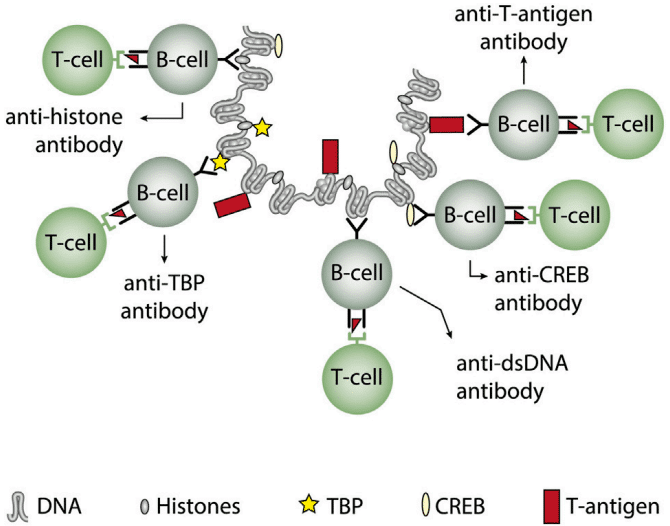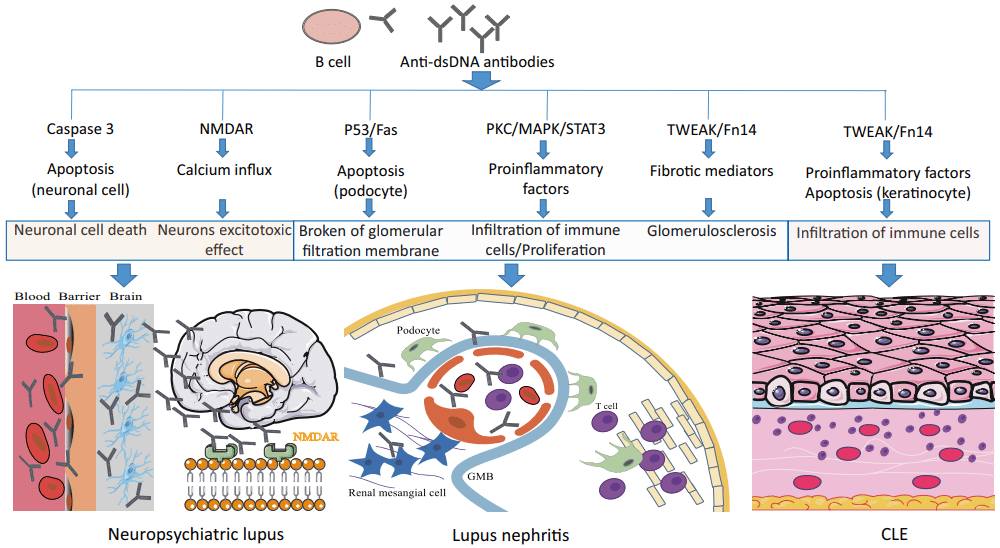NAA Services for Anti-Native DNA
Creative Biolabs is a leading service provider that focuses on antibody products and research, including natural autoantibodies (NAA). After years of efforts and investigations, Creative Biolabs has successfully established a universal NAA platform to provide fast and professional services for our worldwide customers. This platform, as well as our staff and profound experience, can offer a comprehensive range of anti-native DNA and other NAA markers services to help you get success in your NAA research.
Background of Anti-Native DNA
Anti-native DNA antibody, also known as anti-double-stranded DNA antibody, is a kind of anti-nuclear antibody (ANA) that targets the double-stranded DNA. Anti-native DNA antibodies are autoantibodies that firstly isolated from the blood of patients with systemic lupus erythematosus more than 50 years ago. Since then, plenty of animal models and clinical studies indicated and confirmed that the presence of anti-native DNA antibodies is a specific characteristic or hallmark of systemic lupus erythematosus. In addition, recent researches have found that DNA autoantibodies also are implicated in the other pathogenesis, such as chronic liver disease, rheumatoid arthritis, AIDS, and infections.
 Fig.1 Induction of anti-dsDNA antibodies by in vivo expression of a single viral dsDNA-binding protein.1
Fig.1 Induction of anti-dsDNA antibodies by in vivo expression of a single viral dsDNA-binding protein.1
The Role of Anti-Native DNA in Systemic Lupus Erythematosus (SLE)
Systemic lupus erythematosus (SLE) is a kind of autoimmune multisystem disease characterized by multiple autoantibodies involves many parts of the body, including serous membranes, joints, kidneys, skins, nervous system, and blood system. So far, many autoantibodies have been found to bind over 100 different self-molecules in different SLE patients. Among these autoantibodies, ANA and anti-native DNA antibody are among the 11 criteria used for clinical diagnosis of SLE. The anti-native DNA antibody was listed as an immunologic criterion for SLE by the American College of Rheumatology and the Systemic Lupus International Collaborating Clinics years ago.
 Fig.2 The role of anti-dsDNA antibodies in neuropsychiatric lupus, lupus nephritis, and SLE.2
Fig.2 The role of anti-dsDNA antibodies in neuropsychiatric lupus, lupus nephritis, and SLE.2
The Role of Anti-Native DNA in AIDS
Human acquired immune deficiency syndrome (AIDS) is a type of infection by human immunodeficiency virus (HIV). The association between AIDS and autoimmunity has attracted lots of attention from clinical and pathophysiological perspectives. HIV-infected patients present higher overall frequency of autoantibodies, which is associated with lower CD4+ cell counts. The diagnosis of AIDS in the setting of a connective tissue disorder like SLE is contentious due to easy misdiagnosis. High levels of IgG antibodies against native DNA have been detected in more than 50% of AIDS patients. Anti-native DNA might be a potential marker for AIDS diagnosis, which needs further investigations to confirm.
Features of Services of Creative Biolabs about NAA
- Increasingly perfect services system (NAA related diseases and markers, products, applications, and custom NAA services)
- Advantages in well-established technology platforms and experienced scientists specialized in NAA research
- Comprehensive NAA services, from NAA detection, NAA profiling, to NAA epitope mapping
- High-quality solutions and perfect after-sale service
If you are working on NAA research, or you are interested in NAA, please feel free to contact us for more information.
References
- Rekvig, Ole Petter. "Systemic lupus erythematosus: definitions, contexts, conflicts, enigmas." Frontiers in Immunology 9 (2018): 387.
- Wang, Yaqi, et al. "The therapeutic strategies for SLE by targeting Anti-dsDNA antibodies." Clinical reviews in allergy & immunology 63.2 (2022): 152-165.

